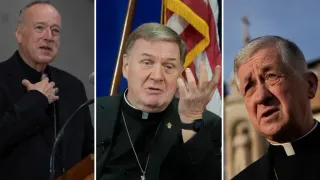March 27, 2014
Missouri's Acceptance of Same-Sex Joint Tax Returns Challenged
Jason St. Amand READ TIME: 4 MIN.
Like clockwork, legislative bills are filed across the country in an attempt to limit transgender restroom use. It has gotten so bad that a Texas special session, initially involving unprecedented flooding along the Guadalupe River, instead turned into a redistricting battle and an attempt to get a restroom ban for the Lone Star State.
As to be expected with these efforts, anti-transgender restroom bans target non-transgender women. Let me provide just a few recent examples.
Gerika Mudra, an 18-year-old lesbian in Minnesota, was singled out by a server at a Buffalo Wild Wings location. It may be worth noting that Mudra is a woman of color and does not dress in a stereotypically feminine fashion.
When Mudra left her friends to use the restroom, the server followed, pounding on the door to the stall Mudra was using. According to Mudra, the server loudly stated, "This is a women’s restroom. The man needs to get out of here." While Mudra protested, the server insisted she needed to leave. It wasn't until Mudra unzipped her sweatshirt and exposed her chest that the server left her alone.
Meanwhile, Dani Davis took a restroom break at the Walmart she worked at in Lake City, Florida. As she used the public restroom in her workplace, she heard a man's voice shouting outside the stall, yelling that he would beat her in order to protect his significant other from a transgender person.
While the man did eventually leave, Davis found herself terminated from her workplace, presumably because she alerted the wrong employee to the incident.
Davis is not transgender, though she is 6 feet 4 inches tall.
In Boston, after Ansley Baker went to use a restroom at the Liberty Hotel, a hotel security guard pounded on the stall door, telling her to leave the restroom and calling her a man. Baker and her girlfriend, Liz Victor, were eventually told to leave the premises. Neither Baker nor Victor are transgender.
I should also note that while it's surely possible that I missed a story, I was unable to find any stories of a transgender person of any gender this year being ejected from a restroom, or, of course, any about transgender people doing something untoward in a stall. That simply is not happening.
What is happening is good old-fashioned misogyny, coupled with witch-hunt levels of frenzy. Some are clearly convinced of an epidemic of transgender people using women's rooms for nefarious purposes and simply need to act on this.
Consider the obvious fact that assaulting women – in restrooms or elsewhere – remains a crime, that it's far easier for a man to put on janitorial overalls than women's attire in order to sneak into a women's room, and that sexual assault is typically caused by someone the victim already knows. None of these seem to come up in discussions of protecting women from assaults in restrooms.
I think it is also noteworthy that the issue of trans restroom use is never about trans masculine people in men's restrooms, nor is it about nonbinary people anywhere.
The issue is always about transgender women and women's restrooms – and lacking an actual transgender person causing issues in restrooms, people will find a non-transgender woman on whom to project their fears.
Many have argued that this, in the end, is all about feminine beauty standards and expectations of stereotypical attire. I think there's a lot of truth in that. Likewise, I feel that racism itself plays a part in some cases, as Black women are often assumed to be masculine. Notice, for example, the number of times the right-wing has attacked former first lady Michelle Obama by claiming that she is a man based on no evidence beyond her appearance not conforming to western beauty standards.
I also feel there is a deeper cultural misunderstanding of just what a transgender person is. And this misreading is at the heart of all this bathroom nonsense – and maybe at the core of much anti-trans animus in the world.
There seems to be some assumption that transgender women are, to put it bluntly, men. That is, that the physical appearance of a transgender woman is going to be akin to a stereotypically masculine man. This makes little sense, especially as I think of the vast majority of trans women I know. Of course, bear in mind that humanity is wildly diverse, and the notion of what a woman – trans or not – looks like covers an amazing amount of ground.
We have a culture that has bought into this for decades. Consider Tony Curtis and Jack Lemmon in “Some Like It Hot,” Robin Williams as the titular character in “Mrs. Doubtfire,” or Jamie Farr as Corporal Klinger in “M*A*S*H.” With each of them are a dozen more forgotten movies and TV shows playing off the exact same tropes. Each of the above is a man who is disguising himself as a woman, but for whom the joke often is centered on their masculinity.
In short, these are not trans women, and this stereotype is deeply flawed. It’s so erroneous that women who are not traditionally “feminine enough” are assumed to also be men trying to get away with a crime by using a restroom.
At the same time, actual, factual trans women in popular culture have not done anything to move the needle. Consider how high profile someone like actor Laverne Cox has been, and yet the stereotype of a trans woman remains mired in Hollywood portrayals of the past.
The belief persists no matter how many times we are seen. It moves into a realm of willful ignorance, as if the stereotype is stronger than the reality.
Like I noted, this is a frenzy. This is a craze that, while propagated by the right, has taken root in the minds of people primed for fear and outrage. The facts are irrelevant, and it is not only transgender people that have to fear, as anyone could be a target of this fury.
Gwen Smith wishes more crazes were of the harmless variety. You'll find her at www.gwensmith.com .






